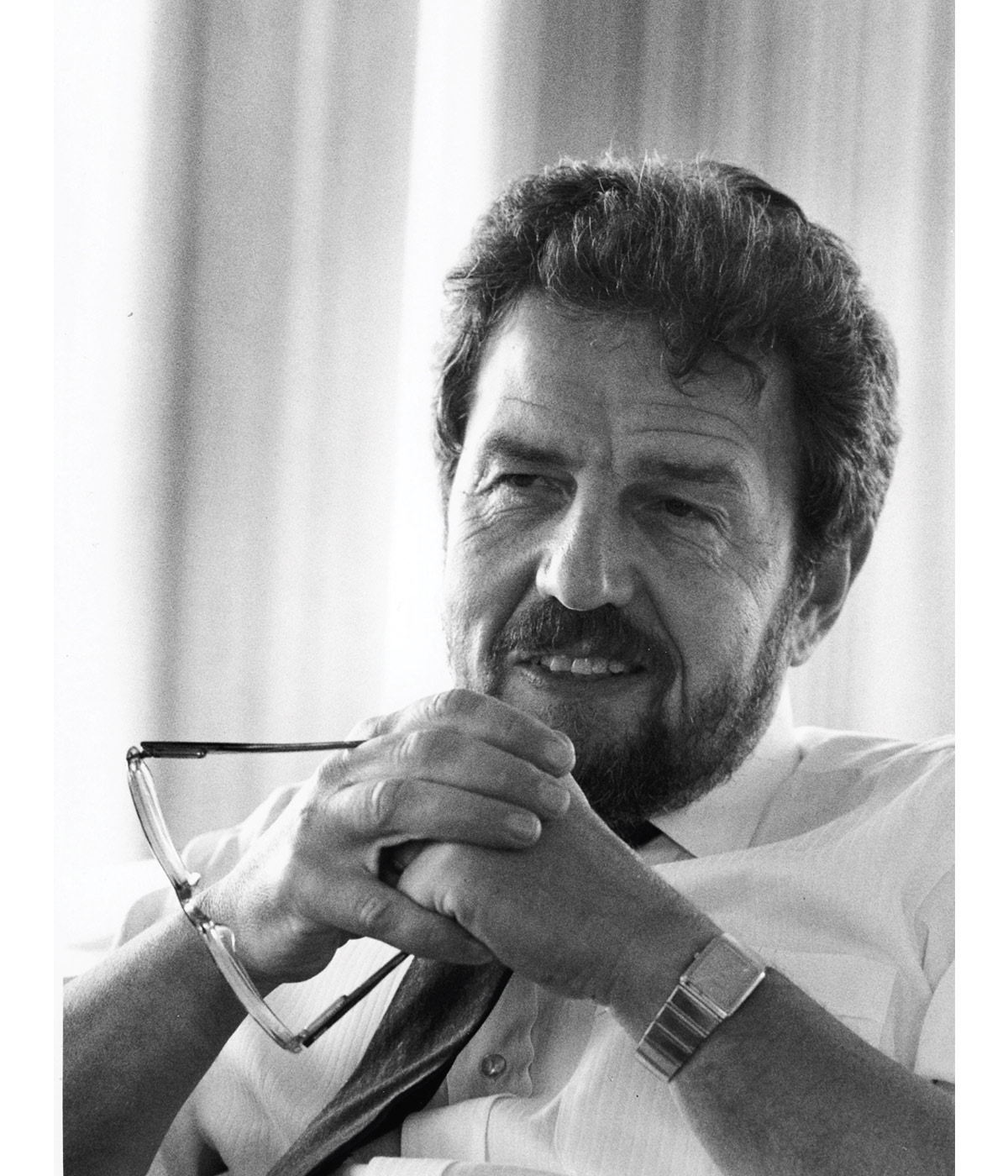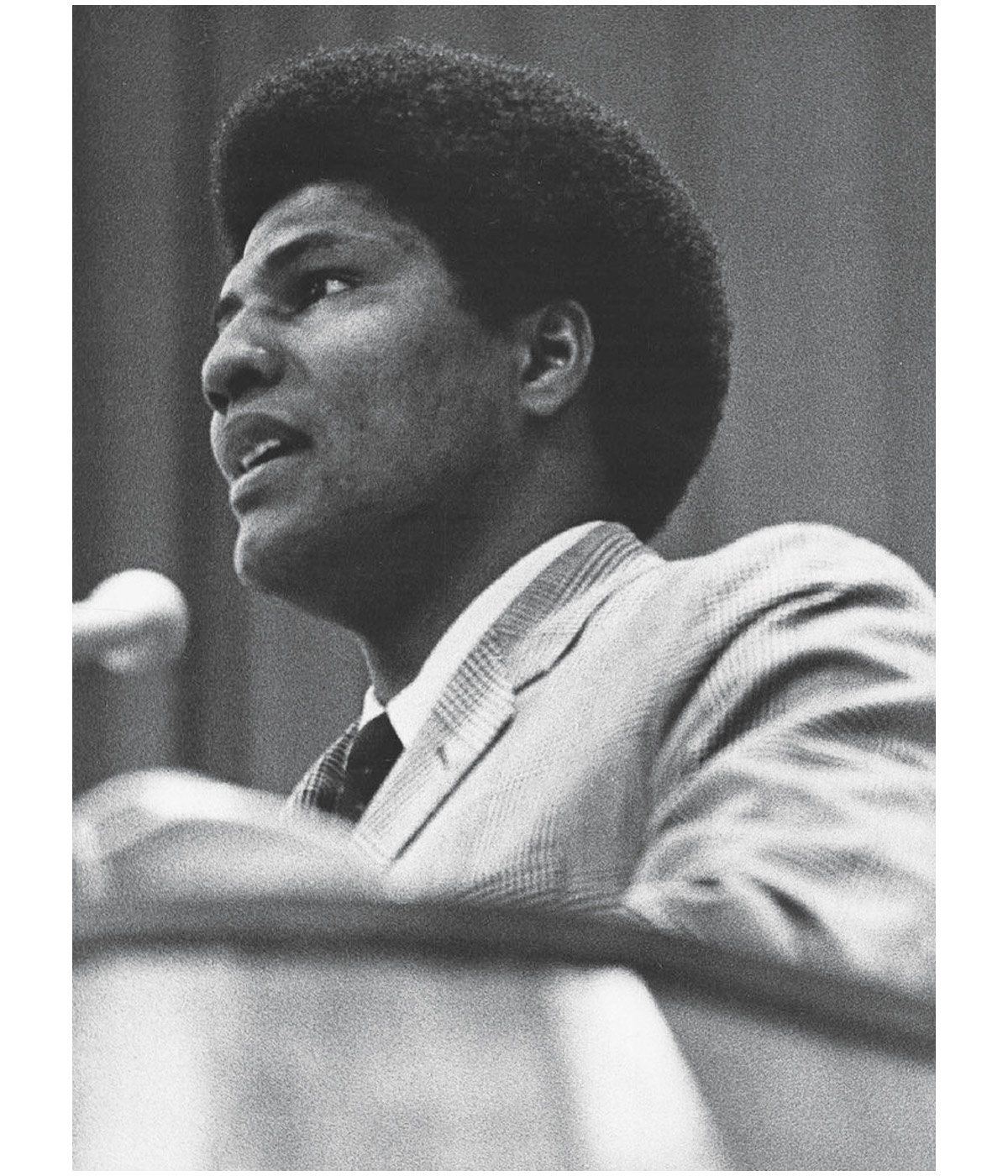The “In Memoriam” section of SF State Magazine is usually devoted to University graduates. But this summer, two non-alumni passed away who each had a huge, lasting impact on SF State. In an issue with so much content looking back at University history, we couldn’t overlook their important contributions.

The Leader Who Made SF State ‘a Different Kind of Public University’
SF State’s 12th president from 1988 to 2012, Robert A. Corrigan passed away peacefully in his San Francisco home on July 5, 2024. He was 89 years old. At his inauguration, he spoke of his bold vision for SF State to become “a different kind of public university, one that is organized around the concept of urban partnership” with faculty members who view the surrounding “city as their classroom.”
“President Corrigan was a national leader in promoting the cause of civic engagement in higher education and reimagining the modern, urban university,” current SF State President Lynn Mahoney said. “Our campus owes him a debt of gratitude for his lasting and impactful contributions to our incredible university and students past, present and future.”
By the time he retired in 2012, there were more than 500 service-learning courses and dozens of University institutes and initiatives that linked the classroom and community. SF State earned national recognition for its approach to education, including a Presidential Award in President Obama’s Higher Education Community Service Honor Roll. Corrigan also made significant progress on another goal: to work with the city and its school district to change the conditions which have put so many urban students at educational risk.
In the late 1990s, Corrigan oversaw the placement of college tutors in K – 12 classrooms nationwide when he chaired President Bill Clinton’s Steering Committee of College and University Presidents for two initiatives: America Reads and America Counts, which focused on improving reading comprehension and mathematical skills, respectively.
“President Corrigan set for SF State the lofty mission of equity and social justice at a time when emphasis on these ideals was unheard of in most academic institutions,” said Professor of Biology Mike Goldman, who was a faculty member during Corrigan’s tenure. “At the same time, he never wavered from his love of the life of the mind and his pride in teaching, learning and research.”

Photo By Bill Peters/The Denver Post via Getty Images
The Man Who Heard the Call and Answered
Dr. Nathan Hare, a sociologist and a leader in the fight for Black Power/Black Education, passed away on June 10, 2024.
Dr. Hare was sought after by the SF State Black Student Union (the first in the nation) to chair the University’s new Black Studies Department at SF State, for his Black Nationalism and his renown as an educator/administrator. Black student organizers were galvanizing interest, increasing enrollment of Black students into the University and into courses created by students and funded by the Associated Students, along with support from then-SF State President John Summerskill. Among the students who worked to bring Hare to San Francisco were Danny Glover, James “Jimmy” Garrett, Joann Mitchell and Judy Hart (now Juanita), with artists LeRoi Jones (Amiri Baraka) and Sonia Sanchez. Before Hare’s arrival in January of 1968, the convocation of the Black Studies Program occurred in May of 1967.
Michael Eric Dyson, the orator and academic, in his eulogy of Dr. Hare asked: “Isn’t it ironic that the very demands of the students provided the opportunity of an academic discipline to come into existence? Now that this academic discipline is brought into existence, because of political fury, why would it deny the legitimate roots of its own origin?”
Dr. Hare knew he was brought to “State” by the call of the students. He was accosted by the administration because he dared to identify with the students. It was the efforts of the students whose protests created a lane for this academic discipline to live.
Hare was a champion prize fighter. He did not come to State to fight with fists. He came with books and a concern for Black students. He knew he must demythologize the notion that intellectual pursuits were removed from all existential, political and social movements. He did not march in the picket lines during the student strike of 1968. He knew, should violence between police and student protesters erupt, he could, as a professional fighter, end up with blood on his hands. He helped students navigate the upheaval, violence and trauma of the long strike. He left the strategizing and organizing to the students.
He was fired by SF State President Samuel Hiyakawa in 1969, in a famous and public struggle between the two. He never held an administrative/academic post, nor a tenured or tenure track position. He founded The Black Scholar: A Journal of Black Studies and Research. He became a clinical psychologist, working in community health care programs, hospitals and in private practice.
Mark Allan Davis
Associate Professor of Africana Studies
College of Ethnic Studies
San Francisco State University
After serving in the U.S. Army, Henry Niebolt (B.A., ’57) earned a degree in English and a California teaching credential. In addition to his long career as an educator, he was a musician. He was principal tuba player for the Golden Gate Park Band for 61 years, played with traveling shows like the Ringling Bros. circus and was a symphonic musician with the Marin Symphony, San Francisco Opera and more.
Michael McLaughlin, founder of McLaughlin Coffee Roasting Co. in 1983, didn’t start off in java. He earned a Physical Education degree in 1965 and a Master of Arts degree. After graduating from SF State, McLaughlin worked as a teacher for 20 years until his brother and cousin, co-founders of Royal Coffee, invited him to become a roaster. Now, McLaughlin’s sons Shaun and Mark run the company, and his wife Barbara is still involved in the business.
Lawrence Haynes (BSN, ’71) died on April 21, 2024. He had a long and successful career in the emergency room and operating room, and as a nursing home administrator. He always spoke fondly of his time at SFSU.
East Contra Costa’s Willie Mims (B.A., ’74) dedicated his life to civil rights and advocacy in education. Throughout his career, he advocated for students and families and worked to end disparities in achievement between Black students and their peers. His political involvement began as early as age 17 and, in 2020, the 75-year-old Mims participated in all six Black Lives Matter marches in Pittsburg.
Rabbi and author Ellen Bernstein (Credential, ’78) went on to establish Shomrei Adamah, America’s first national Jewish environmental organization. She believed the natural environment was connected to the precepts of the Hebrew Bible, seeing the climate crisis as a spiritual crisis that reflects people’s treatment of each other and Earth.
As a student, Philip Klasky (B.A., ’94; M.A., ’97) helped establish the Department of Environmental Studies. He returned to SFSU to join the faculty in American Indian Studies and Race and Resistance Studies. He was director of the Ethnic Studies Student Resource and Empowerment Center, a mentor for the New Leader Scholarship and more. His wife, SF State Librarian Catherine Powell, and his sister Ilene Avery Marwick established the Philip M. Klasky Climate Justice Scholarship to continue his legacy of supporting student activists committed to climate justice and community.
Journalism student Alex Kauffman died in March 2024. His parents adopted him and his older sister from a Ukrainian orphanage. They say his love for journalism started as young as age 6 when he’d watch newscasts while eating breakfast. He transferred to SF State in 2022 hoping to become a news anchor.